I used to think an ionizer was just a fancy fan feature—until I gave one a try. That small switch led to big changes in how I see air purifiers. So, what is ionizer air purifier? It’s a simple tool that uses charged ions to pull dust and other stuff out of the air. After using one for over a year, I’ve learned what works, what doesn’t, and what most people miss. In this guide, I’ll walk you through everything—how it works, what an ionizer on a fan does, and if it’s right for you.
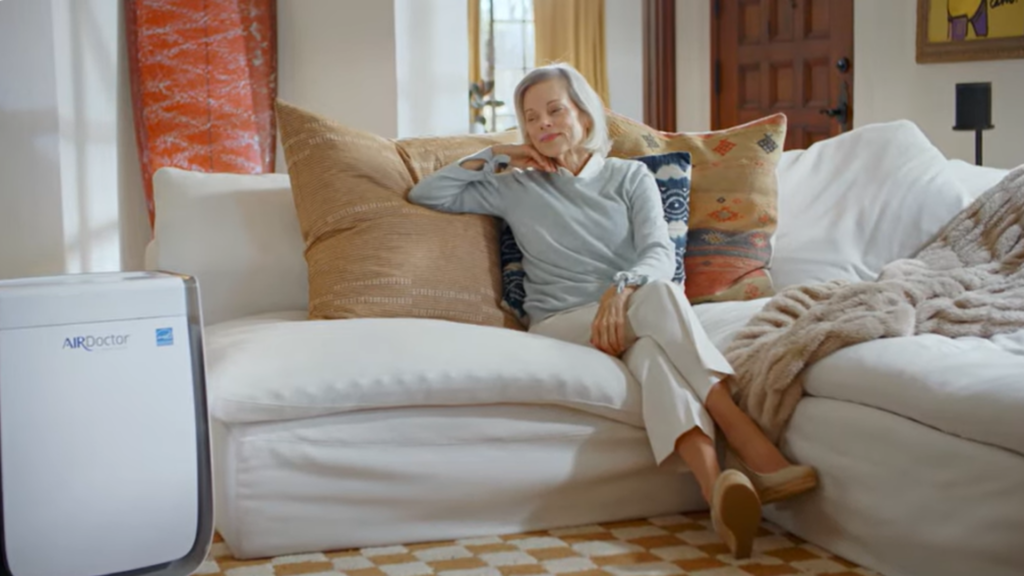
The first time I saw the word “ionizer” on my air purifier, I thought it was just a fancy setting. I had no clue what it did. But then I moved into a dusty room and started sneezing like crazy. Out of pure guesswork, I turned it on—and the change was real.
So, what is ionizer air purifier? It’s a tool that sends out charged ions. These ions stick to tiny things in the air—like dust, pollen, or smoke. That makes them drop to the ground or stick to filters. In short, it helps clean the air.
I still remember waking up after one night with it on. The air felt fresh. My nose felt clear. That’s when I knew—it wasn’t just a fan trick. It actually worked.
How Ionizer Air Purifiers Work (Without the Jargon)
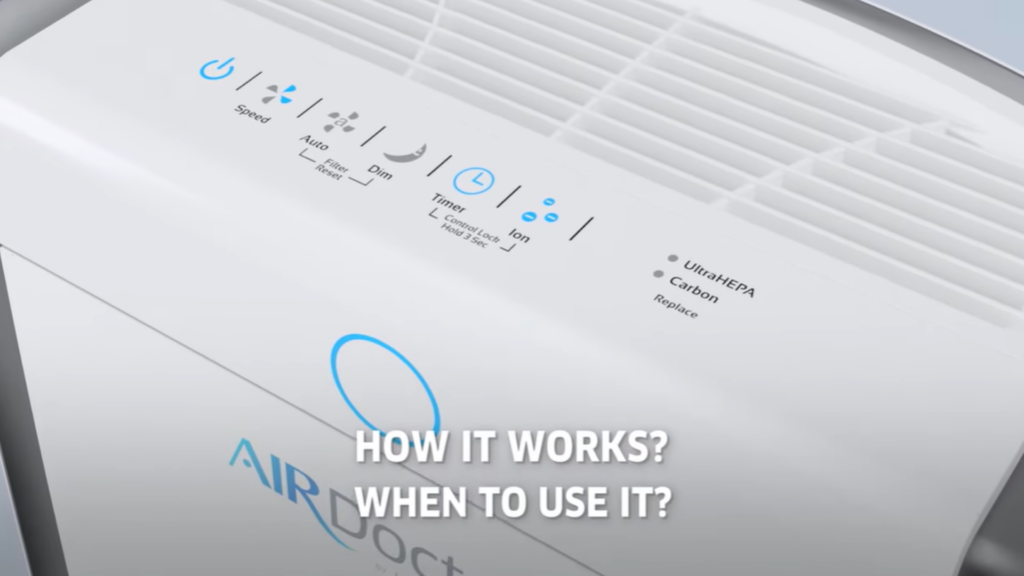
Wondering how an ionizer air purifier works? It’s easy. It sends out tiny charged particles called ions. These ions grab onto dust, smoke, and other stuff floating in the air. Then, those clumps fall to the floor or get caught in a filter. That’s how the air gets clean.
Now, here’s the cool part. Unlike regular air filters, ionizers don’t just trap things. They change how the air acts. Filters need fans to pull air through them. But ionizers work without all that noise.
What makes them special? They go after the really small stuff. Things you can’t even see—like pollen and tiny bits of dirt. This can help your air feel fresh. Some people even say it helps with sneezing and smells.
Let’s break it down real quick:
| Feature | Ionizer | HEPA Filter | Carbon Filter |
| How it works | Sends out ions | Traps stuff in layers | Absorbs smells |
| Best for | Dust, smoke, pollen | Allergies, fine dust | Odors, chemicals |
| Noise level | Very quiet | Can be loud | Quiet |
| Care needed | Wipe clean often | Change filter | Change filter |
| Good in | Bedrooms, small rooms | Allergy-safe spaces | Kitchens, smoke areas |
In short: an ionizer is a low-hassle way to freshen the air. It won’t replace big purifiers, but it’s great for small rooms. If you want less dust and fewer smells, it might be a good match.
What Does an Ionizer Do?
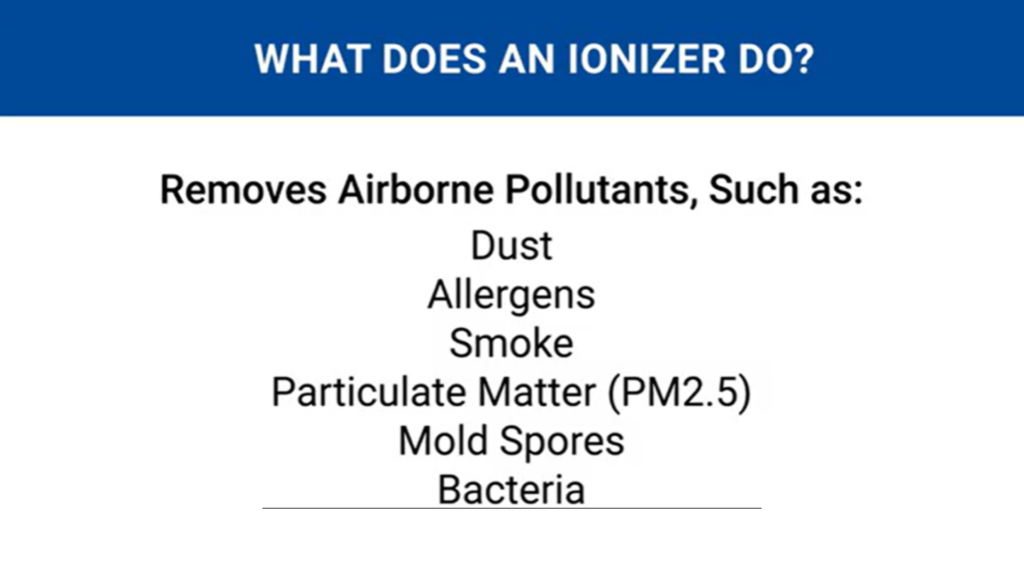
So, what does an ionizer do?
It shoots out negative ions. These ions stick to dust, smoke, and pollen in the air. That makes them heavy. Then they fall to the ground or get trapped on nearby surfaces. The air feels clearer and easier to breathe.
Quick answer: An ionizer sends out ions that pull junk from the air so it falls out of your way.
I first tried one when I lived in a dusty place with a cat. My nose was always stuffy. I turned the ionizer on before bed. The next day, I woke up without sneezing. The room felt calm and clean. I was shocked by how fast it helped.
Quick answer: It helped me with dust and pet dander, and I slept better because of it.
Ionizers are great with tiny stuff. I mean the bits you can’t see—like smoke or mold. Filters can miss those, but ions grab them. Some studies show ionizers clear up to 97% of fine dust in the air. That’s a huge boost for small rooms.
Quick answer: Ionizers can clear most small particles from the air, based on studies.
Now, they don’t make things vanish. The dirt still lands somewhere. So, I run a mop or vacuum now and then. But it’s worth it. The air feels less heavy. And I don’t cough as much.
Quick answer: Dust drops to the floor, so a quick clean helps keep the air fresh.
What Is an Ionizer on a Fan?
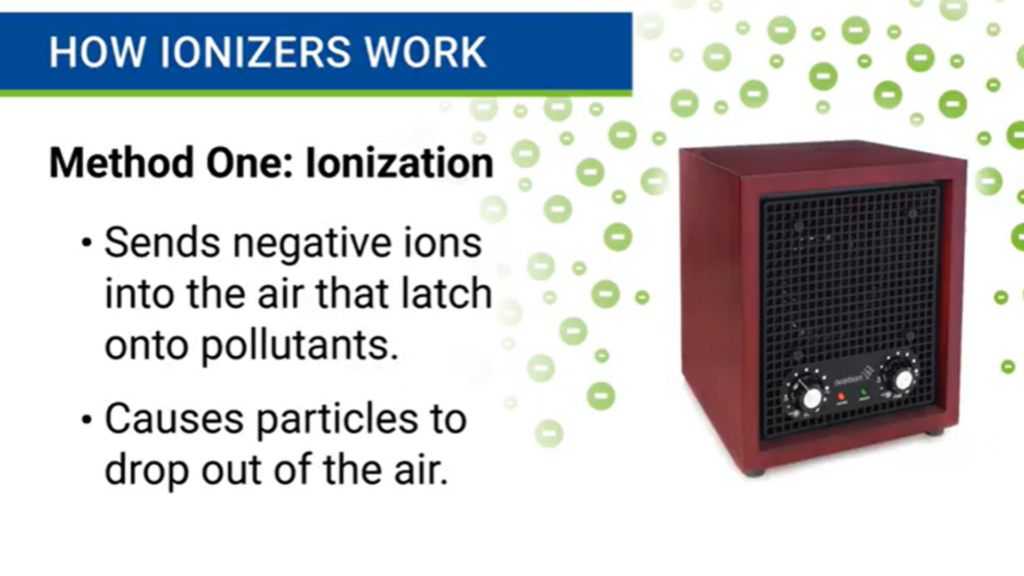
Quick answer: An ionizer on a fan sends out charged ions while the fan blows air, helping clear dust and freshen the room.
When I first saw the word “ionizer” on my fan, I thought it was just for show. I had no idea what it did. But that changed fast. One summer, my room was hot and full of dust. I turned the ionizer on—and wow. The air felt lighter. Not just cool, but clean.
Quick answer: It cools the room and makes the air feel fresh at the same time.
So, what is an ionizer on a fan? It’s a fan that pushes air and releases ions. These ions grab dust, smoke, or pollen from the air. That makes the particles fall down, so you don’t breathe them in.
Quick answer: The ionizer helps remove small stuff from the air while the fan keeps you cool.
Now let’s talk about the pros and cons. First, it saves space. You don’t need two machines. It’s quiet and great for bedrooms or small work areas. It also costs less than a big purifier.
But there are limits. A fan ionizer isn’t as strong as a real air purifier. It’s good for light dust or smells—but not for strong allergies or smoke. Also, you’ll need to clean floors or surfaces, since the dust lands there.
Quick answer: It’s good for light cleaning, but not a full purifier.
Let me share what happened in my home office. I used to feel tired and sneezy after long hours. The fan helped with heat, but the air still felt off. Once I used the ionizer mode, it felt different. The air was crisp. I felt more awake. It really made a change.
Quick answer: In my office, the fan ionizer made the air feel lighter and helped me breathe better.
If you want cleaner air and a cool breeze in one, this is a nice pick. It’s simple, low-cost, and easy to use. Just don’t expect it to fix everything.
Quick answer: A fan with an ionizer is a smart choice for small rooms and fresh air on a budget.
Ionizer vs Other Purifiers: Pros, Cons & My Verdict
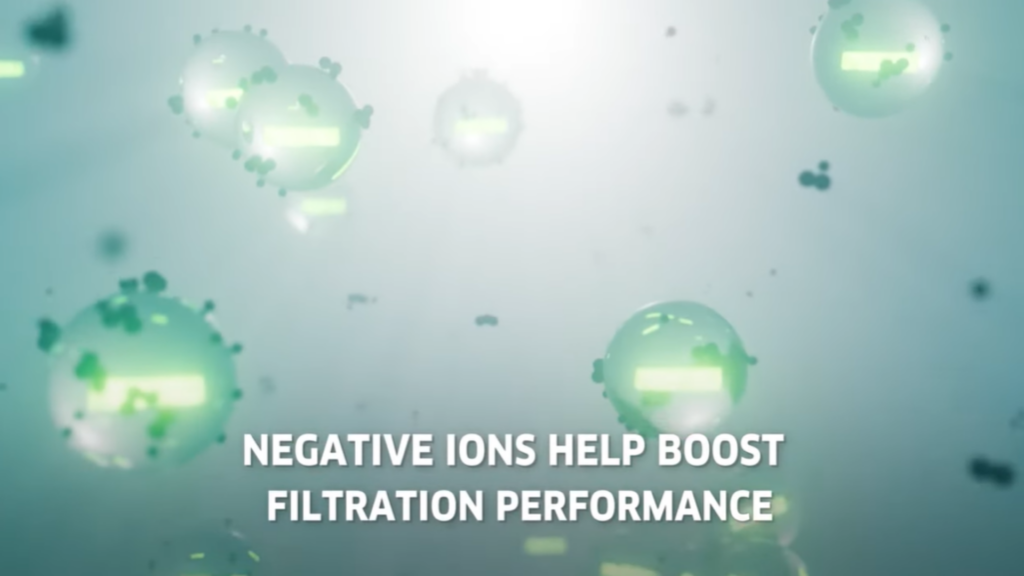
Quick answer: Ionizers are quiet and easy to use, but not great for strong smells or big allergy issues.
I’ve used all kinds of air purifiers. Ionizers, HEPA filters, and even those big ones with carbon layers. They each do a job—but not the same one. You just need to know what fits your space.
Quick answer: Ionizers work best in small rooms. HEPA is better for heavy dust or allergies.
Ionizers are simple. No filters to change. No loud fans. I just turn it on and wipe it down once a week. It runs quiet all night. I like that part a lot.
Quick answer: Ionizers need less care and make almost no sound.
But they don’t catch stuff like a HEPA filter. Ionizers send dust to the floor. That’s fine, but you’ll need to sweep or vacuum more. If you have pets or sneeze a lot, that can be a problem.
Quick answer: Ionizers drop dust out of the air, but you still need to clean it up.
Now about ozone. Some ionizers make a small bit of it. It helps clear smells, but too much is bad for your lungs. I always check for “low ozone” or “ozone-free” on the box. I also don’t use it in tight spots for too long.
Quick answer: Watch for ozone output. Use in short bursts or pick ozone-free models.
So who should use an ionizer? If you live in a dorm, a studio, or a small flat—it’s great. If you want less dust and hate noise, even better. I’d say it’s a smart pick for simple air help.
Quick answer: Ionizers are great for light use in small rooms with low dust.
But if you have pets, allergies, or live near a busy road—go with HEPA. It grabs more junk from the air and locks it in. That’s what you want if your nose is always blocked.
Quick answer: HEPA filters trap more stuff and work better for asthma or allergies.
Here’s what I do: I use the ionizer in my bedroom. It keeps things fresh while I sleep. In my living room, I go with a HEPA filter. That’s where guests and pets hang out. I need more power there.
Quick answer: I use ionizers for light air care, and HEPA filters for deeper cleaning.
So, here’s the deal. Ionizers are great—but not for all jobs. Think of them like a desk fan. Good for some things, but not a full AC. Know your space. Know your needs. Pick what fits.
Quick answer: Ionizers help, but they’re not full purifiers. Use them where they work best.
Is an Ionizer Right for You? Key Things to Know
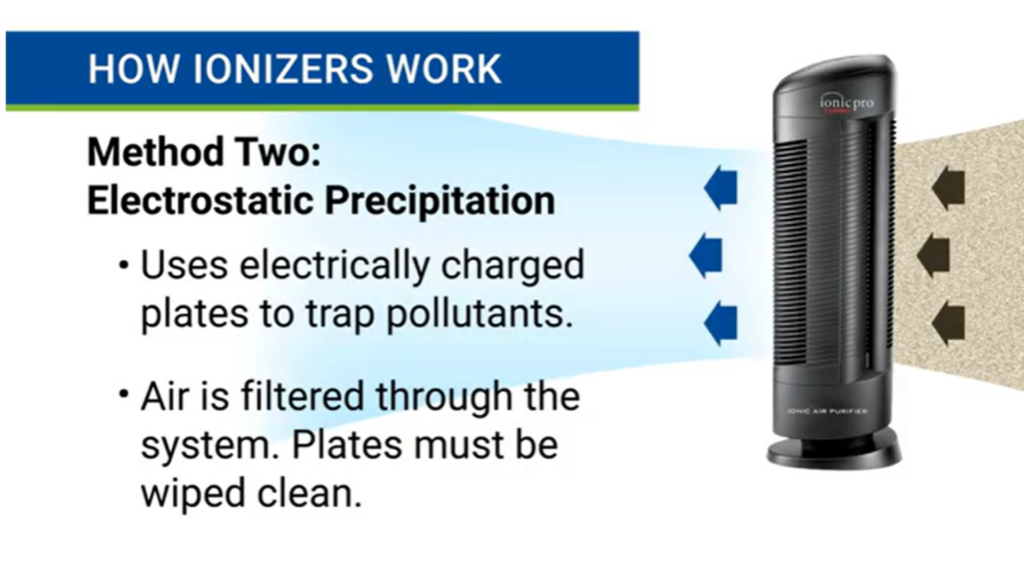
Quick answer: Ionizers work well in small, clean rooms—but not for people with asthma or strong allergies.
Let’s keep this simple. Ionizers can be great. But only if you use them right. I first tried one in a small bedroom. It was quiet and easy to use. After a few days, I noticed less dust. I woke up breathing better.
Quick answer: They help freshen air in small spaces, like bedrooms or home offices.
Ionizers work best in rooms that don’t have too much dust. If you live in a dorm, studio, or a quiet area, it’s a good fit. I often leave mine running while I’m out. When I come back, the air feels light and clean.
Quick answer: Great for light dust and small spaces.
But be careful. If you have asthma or lung issues, you may want to skip it. Some ionizers give off a little ozone. That can bother your lungs. I always choose models that say “low ozone” or “ozone-free.” Trust me—it matters.
Quick answer: People with asthma or lung issues should avoid ionizers with ozone.
Also, don’t buy cheap models with no safety labels. I made that mistake once. The air felt heavy, and I got dizzy. I switched to a trusted brand. It made a big difference.
Quick answer: Only buy from trusted brands that show ozone levels.
Now here’s the part people forget: cleaning. Ionizers don’t trap dirt—they drop it. That dust lands on your table, bed, and floor. So, you still have to clean. I vacuum once a week and wipe things down often. It keeps the air feeling fresh.
Quick answer: You must clean surfaces often—ionizers drop dust but don’t remove it.
So, is this the right pick for you? If you want clean air in a quiet space, and you’re okay with a little upkeep, it’s a smart choice. But for heavy dust or strong smells, you might need something stronger.
Quick answer: Use ionizers for light cleaning. Get a HEPA purifier for deep dust or allergy care.
My Top Ionizer Tips After Years of Use
Quick answer: Want to get the best from your ionizer? These easy tips can make a big difference.
After years of using ionizers, I’ve learned what works—and what doesn’t. These little changes helped me breathe better and keep my room fresh. Here’s what I always do:
- Let it run when you’re not home.
This is my favorite trick. I turn it on before I leave. By the time I’m back, the air feels light and clean. No noise, no dust. - Keep windows shut.
If your window’s open, outside air brings in more dust. That means your ionizer works harder—and less well. Shut the windows, and it works like a charm. - Clean the plates often.
Ionizers don’t trap dirt like filters. Instead, dust sticks to the inside plates or falls to the floor. I wipe the plates every few days. It’s quick and keeps it working great. - Vacuum or sweep the floor.
Ionizers make dust fall, not vanish. If you don’t clean the floor, that dust just hangs around. I vacuum once a week and wipe down surfaces. It really helps. - Don’t use it 24/7 in small rooms.
Some ionizers make a little ozone. Too much isn’t good for your lungs. I run mine for a few hours, then take a break. It keeps the air fresh and safe. - Use it in the right space.
They work best in small rooms like bedrooms or home offices. In big spaces, they can’t do much. I use mine where I rest or work. It makes a big difference. - Pick a trusted brand.
I tried a cheap one once. It didn’t work well and made the air feel weird. I switched to a good brand—and the change was huge. Read the reviews. It’s worth it.
Quick answer: Use your ionizer in a small room, clean it often, and let it run while you’re out. Keep windows shut and floors clean for best results.
FAQs: Quick Answers for Curious Readers
What is an ionizer air purifier?
Quick answer: It sends out ions to clean the air.
I used to think it was just a button on a fan. But it’s more than that. An ionizer makes tiny charged particles. These stick to dust, smoke, or pollen. Then the junk falls to the floor. It’s a quiet way to freshen up the air—no filters needed.
Are ionizers safe to use?
Quick answer: Yes, if you use them the right way.
I was nervous at first too. Some ionizers make a little ozone, which can bug your lungs. I picked one that says “low ozone.” I also keep a window open. I don’t run it all day in a small room. That’s kept things safe and comfy for me.
Do ionizers really work?
Quick answer: Yes, they help in small rooms with dust.
I wasn’t sure at first. But I used one in my bedroom. After a week, I sneezed less and slept better. Ionizers don’t just move the air—they drop the dust. Not magic, but it works!
What’s the difference between an ionizer and a HEPA filter?
Quick answer: Ionizers drop dust. HEPA filters trap it.
Here’s how I see it: ionizers make dust fall. Then you clean it up. HEPA filters suck it in and hold it. I use an ionizer where there’s light dust. I use a HEPA filter where it gets messier.
Can I use an ionizer with pets?
Quick answer: Yes, but clean more often.
I have a cat. So I know the struggle. The ionizer helps with smells and dander. But fur still lands on stuff. I vacuum more now and wipe things down. The air feels fresh, and the litter box room smells better.
Does an ionizer remove odors?
Quick answer: A little—mild smells, yes. Strong ones, not really.
I tried it after cooking fish. It helped some, but not all the way. It works better for light smells—like old air or a hint of smoke. For big smells, I still use a carbon filter.
What is an ionizer on a fan?
Quick answer: It’s a fan that cleans the air while it cools you.
My fan had an “ion” button. I ignored it—until my office felt stuffy. I turned it on. The air felt fresh and cool. It’s not a full purifier, but it’s great for a quick boost.
Final Thoughts: My Simple Take on Ionizer Purifiers
Quick answer: Ionizers are easy to use and help small rooms smell fresh. But they’re not magic. Know what they can and can’t do, and you’ll like them—just like I do.
I’ve used ionizer air purifiers for a few years now. They’re not perfect, but they work well when used right. I used to think they were just fancy fans. But they helped me sleep better and breathe easier. My room even smelled cleaner.
In short: Ionizers clean the air in a quiet, simple way. They’re best for small rooms with light dust.
But here’s the deal—they don’t do everything. They won’t clean like a strong HEPA filter. And yes, you still need to clean your floors. But if you want a quiet way to freshen up the air, they do a good job.
Quick tip: Ionizers make the air feel fresh, but you still have to wipe up the dust that falls.
If you have pets, allergies, or live near a busy road, go with a HEPA filter—or use both. That’s what I do: ionizer in the bedroom, HEPA in the living room. It’s a good mix.
Easy takeaway: Use ionizers when you just need a light air clean. For heavy dust or smells, use a HEPA filter.
Also, keep up the small stuff. Pick a good brand. Clean the plates now and then. It’s simple, but it matters. I had a cheap one that made things worse until I figured it out.
Fast fact: Bad ionizers can give off too much ozone. Pick one that’s “low ozone” or “ozone-free.”
In the end, I think ionizers are great if you want easy air care. They’re quiet, simple, and don’t take much work. Just clean them now and then. If that sounds good to you, you’ll likely enjoy using one.
Bottom line: Ionizers are a smart choice for light air care and low effort—as long as you know what to expect.
Your turn! Have you used an ionizer? Did it help? Let me know in the comments. Share what worked—or what didn’t. Still not sure? Ask me anything. I’ll be real with you, like I would with a friend.
My name is Carlos Gadd, and I am the creator of AirPurityGuide.com.. With a passion for footwear, I share my experiences, insights, and expertise about shoes. Through my blog, I aim to guide readers in making informed decisions, finding the perfect pair, and enhancing their footwear knowledge. Join me on this journey to explore everything about shoes!